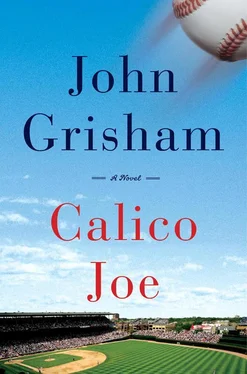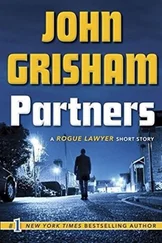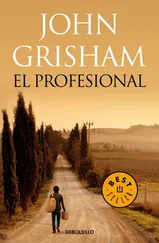“Where did the nickname come from?” I ask.
Clarence chuckles and takes a sip. “ Sports Illustrated , I guess. That’s the first time I ever heard of Calico Joe. But it stuck. The Chicago writers ran with it and never looked back. They had Shoeless Joe a half century earlier, so I guess it was irresistible.”
“It’s such a perfect nickname.”
“It is, or was.”
We watch two men in a boat cast their lines and drift with the current.
“What does Joe do around here?” I ask.
“He takes care of his baseball field.”
“His field?”
“Yes. Joe Castle Field, over at the high school. He mows the grass every morning. He rakes the dirt, pulls weeds, lays the chalk, sweeps the dugouts, and in general putters around the field five days a week. If it snows, Joe scrapes it off the bleachers. When it’s raining, he sits in the dugout, third base side, and watches the puddles form around the infield. When it stops raining, he gently spreads the dirt around so there will be no puddles the next time. About this time of year, after summer ball is over, he’ll paint both dugouts and the press box. It’s his field.”
“Can I see him tomorrow?”
“Again, I’m not his keeper. You can do whatever you want.”
“But would he speak to me?”
“I’ve already explained that, Paul. Joe doesn’t speak to strangers.”
“Would he speak to my father, if I brought him here?”
Clarence coughed and glared at me as if I had insulted his wife. “Are you crazy?”
“Maybe. He’s dying, Clarence, and before he’s gone, I would like for the two men to have a word.”
“What kind of word?”
“I’m not sure, but ideally I would like my father to apologize.”
“Have you discussed this with your father?”
“No, not yet, and before I do, I need to know if Joe will agree to a meeting.”
“I doubt seriously if that can happen, Paul. And it would be a huge mistake for Warren Tracey to show up here in Calico Rock. That could start some serious trouble.”
10

It took a week for the black eye to fade away, and I spent most of the time in my room, reading and looking in the mirror. My father stopped by twice with clumsy efforts at making peace, but I was not in the mood. When you get backhanded by your father, the pain lasts far longer than the bruises. Mercifully, the Mets left town for a long road trip, and I ventured out of my room and tried to enjoy the last month of my summer break.
On August 8, the Mets shut out the Astros in Houston. My father pitched seven innings, gave up only three hits, walked only two, and won his fifth game of the season. I listened to the game in the den and, as usual, recorded every pitch and play on my official Mets scorecard. I knew it was his best game in many years, and as Lindsey Nelson and Ralph Kiner said nice things about my father, I couldn’t help but feel a tiny bit of pride, although grudgingly. I was getting in bed when he called home and wanted to chat about the game. We stayed on the phone for half an hour as he recounted the highlights and patiently answered my questions, and when we eventually said good night, I was so excited I had trouble sleeping. Four days later, he pitched a complete-game four-hitter against the Padres for his second win in a row, a rare feat for Warren Tracey. Because he was on the West Coast, he did not call me after the game, but late the next morning he checked in from his hotel room, and we talked for almost an hour.
My mother was happy because I was happy, but she was also suspicious about his sudden interest in me. My bruises were gone, and the emotional scars were fading, or so I thought.
In the New York papers, the battle was still raging over Warren Tracey and whether he should get benched or sent down. His two consecutive wins cooled his critics but did little to arouse any support. The Mets were coming to life, though it looked as if no team could catch the Cubs. Joe Castle was still red-hot and front-page news in Chicago and wherever he happened to be playing.
I made the calculations a dozen times, and assuming no sudden changes in the pitching rotations, the lineups, injuries, or disruptions due to weather, the Cubs would arrive at Shea Stadium on Friday, August 24. Joe Castle would make his New York debut, and my father would be on the mound. The Cubs would be in first place in the East, and the Mets, in all likelihood, would be in second. When I considered this, and I did so at least ten times each day that August, my stomach would tie itself in knots, and I could not swallow water. Warren Tracey versus Joe Castle. My feelings for my father were hopelessly mixed and confused. For the most part, I despised him; yet he was my father, and he was a professional baseball player pitching for the New York Mets! How many eleven-year-old boys could make such a claim? We lived in the same house. We had the same ancestors, name, address. His success or failure had a direct impact on me. I adored his parents, though I rarely saw them. He was my father, damn it! I wanted him to win.
However, the world of baseball was revolving around Joe Castle. He sold out wherever he went, and the seats were often filled during pregame batting practice. He was hounded by reporters so fiercely that he was hiding from them. On the road, fans flocked to the Cubs’ hotels hoping for an autograph or a glimpse. Young women were sending all types of proposals, marriage and otherwise. His teammates and coaches were devising schemes to protect his privacy. Insanity ruled off the field, but between the chalk lines Joe Castle continued to play like a kid on a sandlot. He sprinted after foul balls, lunged into the stands, turned lazy singles into doubles, bunted with two strikes, violently broke up double plays, tagged up on every fly ball to the outfield, usually had the dirtiest uniform when the game was over, and through it all ripped baseballs to all corners of the field.
The thought of Joe digging in against my father was overwhelming, but as the long hot days of August moved along, I found myself thinking of nothing else. My buddies were hounding me for tickets. The four games against the Cubs were sold out. New York was waiting.
* * *
His five-game suspension for punching out Dutch Patton ended on August 17, and with a talent for the dramatic Joe returned to a raucous Wrigley Field for an afternoon game against the Dodgers. He singled in the first, doubled in the fourth, tripled in the seventh, and when he stepped to the plate in the bottom of the ninth, he only needed a home run to complete the cycle. The Cubs needed a home run to win the game. Batting right-handed, he poked a blooper down the right field line, and as it rolled slowly to the wall, the race was on. Ron Santo scored easily from second with the tying run, and when Joe sprinted to third, he ignored the coach’s signal to stop. He never slowed down. The shortstop took the relay, looked at third, where Joe would have an easy triple, then hesitated at the sight of him streaking home. The throw was perfect, and the catcher, Joe Ferguson, snatched it and blocked the plate. Ferguson was six feet two, 200 pounds. Joe was six feet two, 185 pounds. In a split-second decision, neither chose to yield an inch. Joe lowered his head, left his feet, and crashed into Ferguson. The collision was thunderous and spun both players in violent circles in the dirt. Joe would’ve been out by three feet, but the ball was loose and rolling in the grass.
It was an inside-the-park home run, his first, and it was a miracle that both he and Ferguson walked away from the collision, though both did so rather slowly.
Читать дальше












